
Environnement Risques & Sante
Scope & Guideline
Navigating the Complexities of Environmental Safety
Introduction
Aims and Scopes
- Environmental Health Research:
The journal emphasizes studies that explore the impact of environmental factors, such as air quality, chemical exposures, and pollutants, on human health, particularly in vulnerable populations. - Risk Assessment Methodologies:
It promotes innovative methodologies for assessing risks associated with environmental exposures, including the development of indicators and models to evaluate health impacts. - Interdisciplinary Approaches:
The journal encourages interdisciplinary research that integrates perspectives from public health, environmental science, sociology, and policy-making to address complex health-environment interactions. - Policy Guidance and Advocacy:
Research published in the journal often aims to inform and guide public health policies, with a focus on translating scientific findings into actionable recommendations for stakeholders. - Community Engagement and Citizen Science:
There is a consistent focus on involving communities and stakeholders in environmental health research, promoting citizen science as a means to enhance public understanding and participation.
Trending and Emerging
- Climate Change and Health Interactions:
There is a significant increase in studies examining the interconnections between climate change and health, highlighting the need for adaptive strategies in public health to mitigate the impacts of climate-related risks. - One Health Approach:
The 'One Health' perspective is gaining traction, with research emphasizing the interconnectedness of human, animal, and environmental health, particularly in the context of zoonotic diseases and ecosystem health. - Emerging Contaminants and Microplastics:
Research on emerging contaminants, including microplastics and their health implications, is becoming a prominent focus, reflecting growing public and scientific concern about these pollutants. - Social Determinants of Health:
There is an increasing emphasis on the social determinants of health and their relationship with environmental factors, acknowledging how socio-economic status, education, and community engagement influence health outcomes. - Mental Health and Environmental Stressors:
The exploration of mental health in relation to environmental stressors, such as pollution and climate anxiety, is emerging as a critical area of research, recognizing the psychological impacts of environmental degradation.
Declining or Waning
- Historical Perspectives on Environmental Issues:
Research focusing solely on historical analyses of past environmental health issues seems to be less prevalent, as the journal shifts towards more contemporary challenges and solutions. - Narrowly Defined Chemical Exposures:
There is a noticeable decrease in studies that address specific chemical exposures in isolation, as the journal increasingly favors research that examines the cumulative and interactive effects of multiple exposures. - Conventional Risk Communication Strategies:
Traditional approaches to risk communication are fading, giving way to more innovative and community-based methods that engage the public in dialogue and participatory decision-making. - Single-Disease Focus Studies:
The trend of publishing research that concentrates on a single disease outcome is declining, with a growing emphasis on understanding the broader impacts of environmental factors on multi-morbidity and overall health.
Similar Journals

Revista de Salud Ambiental
Uniting Experts to Elevate Environmental Health StandardsRevista de Salud Ambiental is a prestigious scientific journal dedicated to advancing knowledge in the field of environmental health. Published by the SOC ESPANOLA SANIDAD AMBIENTAL, this Open Access journal has been providing free access to its articles since 2001, ensuring that critical research on environmental influences on public health is widely available to researchers, professionals, and students worldwide. With an ISSN of 1577-9572 and E-ISSN 1697-2791, the journal covers a broad range of topics including environmental toxins, pollution management, and sustainable public health practices. Its commitment to high-quality research is reflected in its rigorous peer-review process, aiming to drive significant advancements in environmental health science. By promoting interdisciplinary collaboration and dissemination of impactful research, Revista de Salud Ambiental plays a vital role in shaping environmental health policies and practices, making it an essential resource for anyone invested in the future of public health.
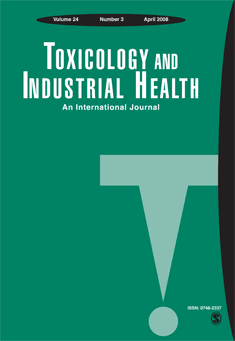
TOXICOLOGY AND INDUSTRIAL HEALTH
Advancing knowledge in toxicology for a safer industrial future.TOXICOLOGY AND INDUSTRIAL HEALTH, published by SAGE PUBLICATIONS INC, is a premier journal in the field of toxicology, public health, and environmental health, with a significant history dating back to 1985. With its ISSN 0748-2337 and E-ISSN 1477-0393, the journal provides a platform for disseminating groundbreaking research and comprehensive reviews that address the complexities of toxic substances in industrial and occupational settings. Despite its Q3 ranking among peers in health, toxicology, and public health, this journal is becoming increasingly influential, reflected in its growing citation metrics. Researchers and professionals benefit from its commitment to fostering knowledge in both theoretical and practical contexts, making it an essential resource for those dedicated to advancing understanding in this vital field. The journal's main objectives include promoting research addressing the implications of toxicology on health and safety standards across industries, ensuring accessibility to current studies for a global audience. Overall, TOXICOLOGY AND INDUSTRIAL HEALTH plays a critical role in bridging the gap between research and real-world applications, proving invaluable to students, professionals, and researchers alike in their pursuit of enhancing public health and environmental safety.
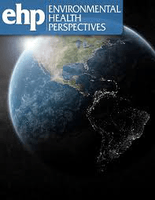
ENVIRONMENTAL HEALTH PERSPECTIVES
Pioneering discoveries that shape environmental health policy.Environmental Health Perspectives (EHP) is a premier open-access journal published by the U.S. Department of Health and Human Services, Public Health Science, dedicated to publishing rigorous and impactful research in the field of environmental health. Since its inception in 1972, EHP has become a leading platform for disseminating knowledge on the interactions between the environment and human health, making significant contributions to the fields of toxicology and public health. With an impressive impact factor and a Q1 ranking in both Health, Toxicology and Mutagenesis and Public Health, Environmental and Occupational Health categories, EHP ranks among the top journals globally, reflecting its high citation and visibility within the academic community. Researchers, professionals, and students alike will find a wealth of vital information within its pages, as EHP covers a wide array of topics related to environmental exposures, health outcomes, and policy implications. Furthermore, EHP engages with a global audience through its commitment to open access, ensuring that critical research is available to all, enhancing the collective understanding of environmental health issues since 1972.

Current Environmental Health Reports
Driving impactful dialogue on environmental health policies.Current Environmental Health Reports, published by SpringerNature, is a leading journal dedicated to advancing research in the multifaceted domains of environmental health. With an impressive impact factor and a distinguished Q1 ranking in several categories—such as Health, Toxicology and Mutagenesis, Public Health, and Environmental Science—this journal provides a premier platform for scholars, researchers, and professionals to disseminate their findings. Since its inception in 2014, it has showcased critical studies that address pressing environmental issues, health risks, and regulatory frameworks, guided by a commitment to high-quality research and policy dialogue. Whether through original research articles, reviews, or policy perspectives, Current Environmental Health Reports strives to inform and influence practice and public policy in environmental health, making it an essential resource for those engaged in this vital field. Accessible only through institutional subscriptions, the journal continues to illuminate the interplay between environmental factors and human health through innovative and impactful scholarship.
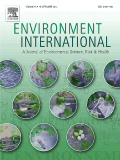
ENVIRONMENT INTERNATIONAL
Elevating Environmental Science Through Impactful ResearchENVIRONMENT INTERNATIONAL is a premier journal dedicated to advancing the field of environmental science. Published by PERGAMON-ELSEVIER SCIENCE LTD, it boasts an impressive impact factor and holds a prestigious Q1 classification in the Environmental Science category, reflecting its influence and reputation within academia. Since transitioning to Open Access in 2019, the journal has increased its accessibility, allowing a wider audience—from researchers to industry professionals—to engage with cutting-edge studies that address crucial environmental challenges. With a Scopus rank of #3 out of 233 in General Environmental Science and a commendable 98th percentile, ENVIRONMENT INTERNATIONAL is committed to publishing high-quality research that informs policy and practice. Covering a broad spectrum of topics from pollution and climate change to sustainable development, this journal serves as a vital resource for those dedicated to making a positive impact on our planet. For submissions, inquiries, or to explore its extensive archives dating from 1976 to 2024, please visit their site at the Kidlington, Oxford headquarters.
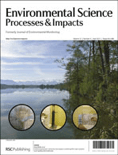
Environmental Science-Processes & Impacts
Illuminating the processes that protect our planet.Environmental Science-Processes & Impacts is a premier journal published by the Royal Society of Chemistry, focusing on critical research in the field of environmental science. With ISSN 2050-7887 and E-ISSN 2050-7895, this journal has established itself as an authoritative source of knowledge since its inception in 2012, maintaining a remarkable Q1 quartile ranking across significant categories such as Environmental Chemistry, Management, Monitoring, Policy and Law, Medicine, and Public Health for the year 2023. It stands as an essential resource for professionals, researchers, and students, aimed at advancing scientific understanding and solutions to pressing environmental issues. With impressive ranks in Scopus, including #45 in Public Health and #27 in Environmental Chemistry, the journal provides a platform for impactful research and interdisciplinary collaboration, emphasizing open access to foster the dissemination of knowledge globally. Join a community committed to exploring the interconnectedness of environmental processes and their implications for society by contributing to or learning from cutting-edge studies published in this esteemed journal.

Exposure and Health
Empowering researchers to tackle exposure assessment challenges.Exposure and Health is a pioneering journal published by Springer, specializing in the interdisciplinary fields of health, toxicology, and environmental sciences. With an ISSN of 2451-9766 and E-ISSN of 2451-9685, this open-access journal exemplifies a commitment to disseminating high-quality research that informs public health practices and policies globally. Situated in the Netherlands, it boasts an impressive impact factor and ranks in the top quartile (Q1) across multiple categories in the 2023 Scopus rankings, including Health, Toxicology and Mutagenesis, Pollution, and Water Science and Technology. The journal is dedicated to advancing knowledge on the interactions between environmental factors and health outcomes, making it a vital resource for researchers, professionals, and students in these critical fields. Exposure and Health actively encourages submissions that address the challenges of exposure assessment, risk management, and the promotion of sustainable public health initiatives.

Environmental Health
Advancing the Nexus of Environment and HealthEnvironmental Health is a premier, peer-reviewed journal dedicated to advancing knowledge in the interdisciplinary field of environmental health. Published by BMC since 2002, this Open Access journal aims to disseminate impactful research that addresses the critical intersections between environmental factors and public health. With its impressive stature as a Q1 journal in key categories, including Health, Toxicology and Mutagenesis, Medicine (miscellaneous), and Public Health, Environmental and Occupational Health, it ranks within the top tier of its field, boasting significant visibility and a high impact factor as demonstrated by Scopus rankings. Scholars and practitioners alike benefit from its well-rounded approach and commitment to bridging science and policy, making it essential reading for anyone invested in understanding and mitigating environmental health risks. The journal is based in the United Kingdom, with a focus on promoting global accessibility to its findings.
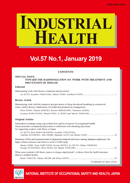
INDUSTRIAL HEALTH
Fostering Excellence in Public and Occupational HealthINDUSTRIAL HEALTH is a premier journal dedicated to the dissemination of innovative research in the fields of public health, environmental and occupational health, as well as toxicology and mutagenesis. Published by the National Institute of Occupational Safety and Health in Japan, the journal has been a critical resource for over six decades, covering essential topics from 1963 to the present day. With an impressive placement in the second quartile (Q2) of the Public Health, Environmental and Occupational Health category and a third quartile (Q3) in Health, Toxicology, and Mutagenesis, it is recognized for its significant contribution to advancing knowledge and improving practices within the industry. While not an open-access journal, INDUSTRIAL HEALTH offers researchers and students access to a wealth of knowledge through its rich archive of articles, fostering a deeper understanding of health and safety challenges in industrial settings. The journal’s dedication to high-quality research and its strategic role in promoting occupational safety make it an invaluable asset for professionals seeking to enhance health standards and safety protocols worldwide.
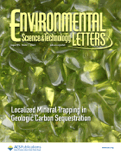
Environmental Science & Technology Letters
Transforming research into actionable environmental solutions.Environmental Science & Technology Letters, published by the American Chemical Society, stands as a premier journal in the realm of environmental science and technology, focusing on pivotal studies that address pressing environmental challenges. With an impressive Q1 ranking in multiple categories including Ecology, Environmental Chemistry, and Pollution, this journal maintains a position of excellence within its field, achieving Scopus ranks that place it in the top percentile of Environmental Science disciplines. Although not open access, Environmental Science & Technology Letters offers vital insights and cutting-edge research that contribute significantly to the understanding and management of environmental issues. The journal’s objectives include disseminating ground-breaking findings and promoting discussions that lead to sustainable solutions. With convergence from 2013 to 2024, it continues to serve as an essential resource for researchers, professionals, and students committed to advancing knowledge and innovation in environmental science.